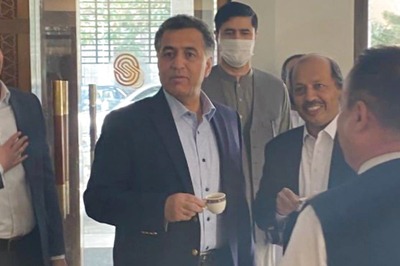
views
New Delhi: The Supreme Court has set up a six-member committee of experts to appraise the effect of spray of disinfectants in airplanes while passengers are on board.
At present, there is a complete ban by the National Green Tribunal (NGT) on disinfectant fumigation inside a plane when passengers are on-board.
A bench headed by Justice DY Chandrachud agreed with the central government that a wider consultation by the panel, comprising experts on vector borne diseases, is required to comprehensively investigate the subject matter and submit its report within two months.
"The issue of disinsecting of aircraft involves, on the one hand, concerns relating to the need to take steps for preventing the transmission of vector borne-diseases. On the other hand, it involves issues pertaining to the health of passengers and crew who may be exposed to insecticides," noted the bench.
Hence, it added, the entire matter should be considered by the committee, which includes experts and academicians such as professor AP Dash, Dr P Jambulingam, Dr AK Singh, Dr B Nagpal, Dr Asutosh Biswas and a representative of the Central Insecticides Board & Registration Committee.
"We accordingly direct that the Committee shall enquire into all relevant aspects bearing upon the need for disinsection of aircraft as a measure designed to control the spread of vector-borne diseases," ordered the bench on Friday.
It said that the committee should examine aspects such as the need for disinsection of aircraft, the recommendations made by the WHO and the best practices followed internationally.
Other issues to be investigated include impact of disinsection on the health and safety of passengers and crew, the modalities to be followed for disinsection, and the steps required to ensure adequate safeguards are observed to protect the health and safety of passengers and crew who may be exposed to disinsection, if disinfection is required.
The bench further maintained that the committee shall be at liberty to examine all other pertinent issues as well and could hear all the stakeholders, including the representatives of the airlines, which may be impacted by any decision taken thereon.
It directed the committee to submit its report within two months, while adding that a senior officer of the ministry of health and family welfare shall act as the convenor of the committee and arrange for all logistical issues in regard to the travel, transportation and stay of the members of the committee, wherever required.
The top court has also allowed demonstration of the process of disinsection during the study by the committee.
The bench is examining an appeal moved by the IndiGo Airlines, which has challenged orders of the NGT and consequent directions to the Directorate General of Civil Aviation (DGCA).
By its order in August 2015, the tribunal had directed the DGCA to ensure that no disinfectant fumigation is carried out inside a plane when a passenger is inside.
IndiGo's repeated pleas seeing modification of this order were rejected by the NGT. Most recently, in October 2018, the green panel had dismissed yet another application by the Indigo, stating that none of the airlines were able to show that such a spray is not injurious to human health.
InterGlobe Aviation Ltd-run IndiGo had contended there was a spiraling growth in dengue and malaria cases with the onset of monsoons and due to the "blanket ban", they were not able to take any step for the protection and safety of passengers.
It said the airports which are most affected by the mosquito problem are Kolkata, Patna, Lucknow, Delhi, Guwahati, Raipur, Ahmedabad, Chennai, Jaipur, Pune, Bengaluru, Dehradun and Bhubaneswar.



















Comments
0 comment